
I love that my children embrace technology, as it’s opened up new worlds for them. They love looking up musicians on YouTube (I’m looking at you Sing Movie), Google Earth, as well as Minecraft and Angry Birds, and educational apps. I do believe that kids’ lives can be enhanced with technology, but it’s important to not overdo it. Technology helps with developing social skills like empathy, coordination, reaction time and language skills. However, too much screen time can diminish real-life discovery and make my kids downright anti-social! We do try to manage our children’s screen time, but with three kids and a busy life, I can’t always watch how long they are on their tablets and what exactly they are doing. That’s why I’m excited to partner up with Screen Time app, to make things better in my house. Screen Time is a device-management app that helps parents like me ensure their kids are balancing their use of technology with real-life adventures and activities.
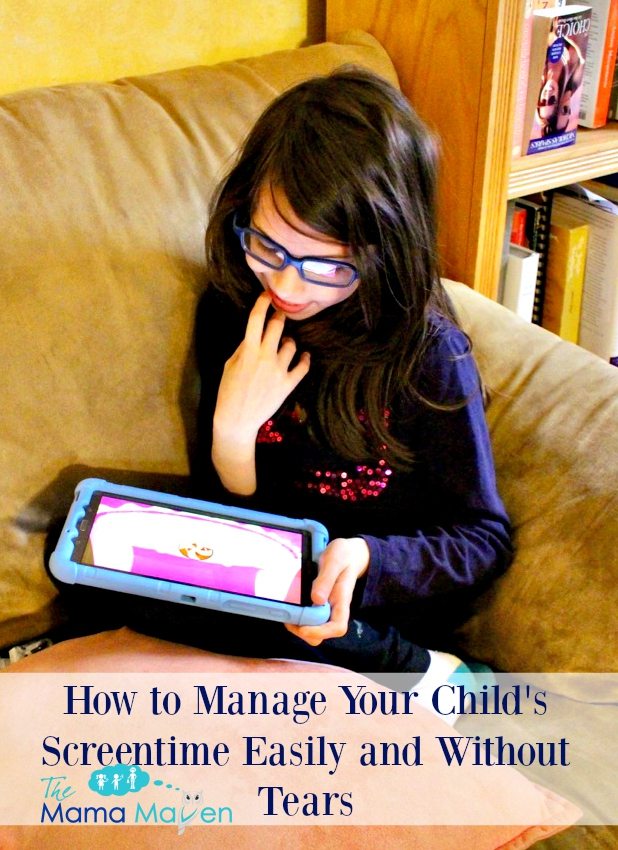
Built by parents for parents and launched in 2013, Screen Time includes features such as daily time limits (yes!), a pause-and-play button, app blocking, online monitoring and more. With over one million downloads worldwide, Screen Time offers a free 14-day trial and is available for iOS and Android wherever you get your apps.
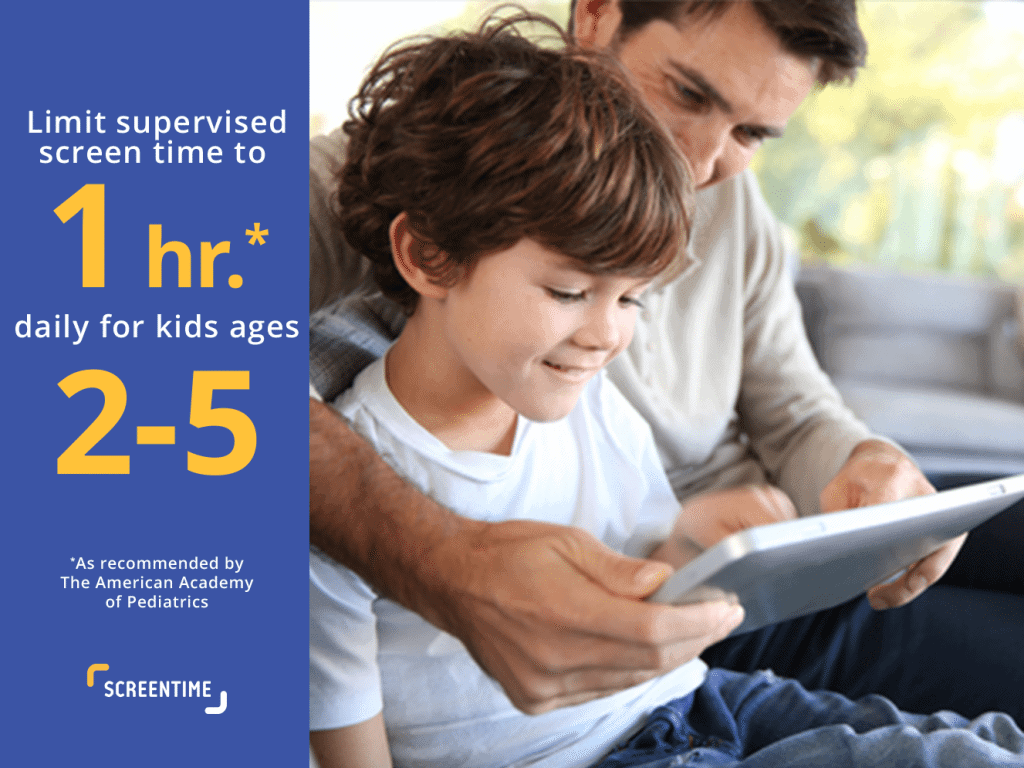
How much time should kids actually be on tablets and mobile devices? Here’s the formula, according to Screen Time.
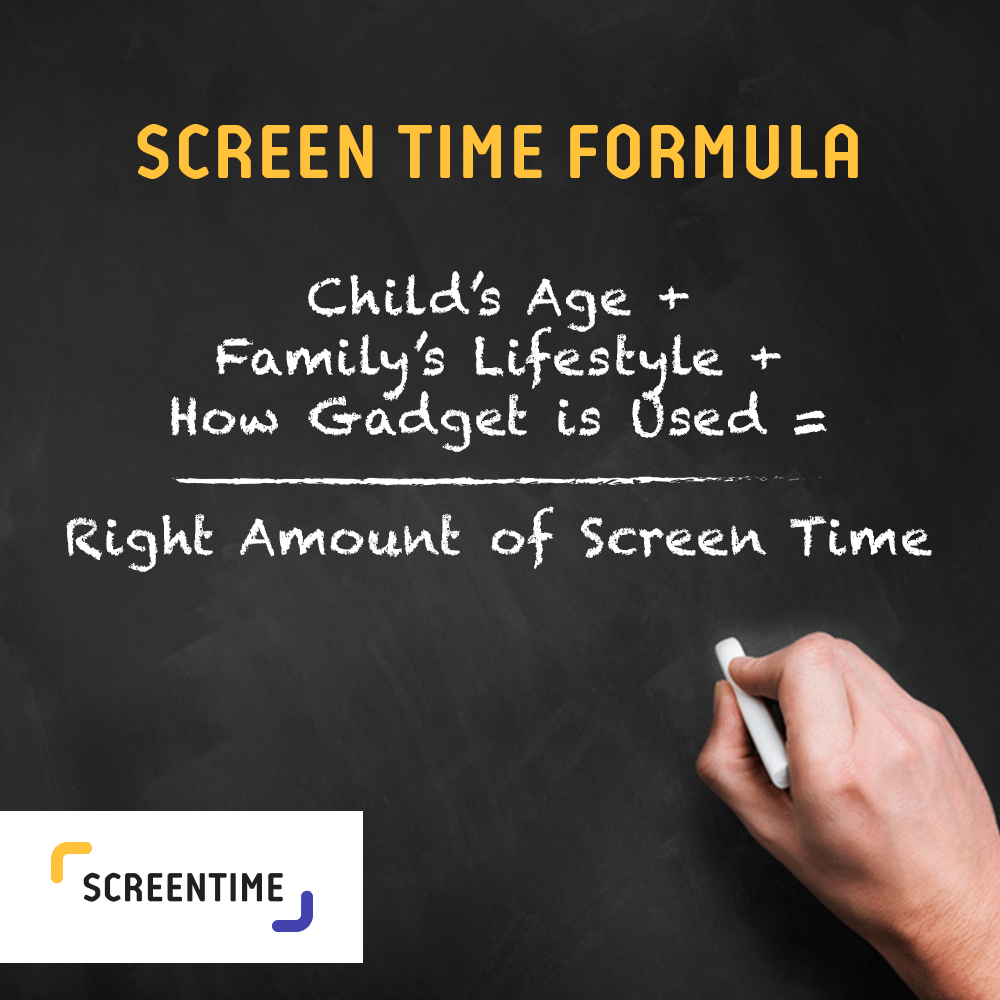
My husband and I sat down with our kids and we signed the Our Family Screentime Pact that Screen Time provided us with. While my kids weren’t entirely happy about it, we explained that as parents, it’s our job to care. We have to make sure we are making sure they aren’t on their tablets too much and while we have a rule that tablets aren’t to be used from Monday to Thursdays, we hadn’t been really monitoring what they were doing on Fridays to Sundays. Somehow, 20 minutes would stretch into 35 or 40 minutes and it has been getting out of control. Luckily it’s not like last year, when we found out that my oldest son was in chatrooms on Minecraft. We took away the WIFI from him and really tried watch what he did on his tablet. He still isn’t allowed to go in the chatrooms, but we recently let him get a private instagram account, which we monitor. My daughter is easier, she has only the apps that I’ve put on, but if I don’t monitor how long she’s on her tablet, she won’t get off. Also, both my husband and I are guilty of being on our phones a little too much. This pact will help our family and I am excited to report in a few weeks how we do!
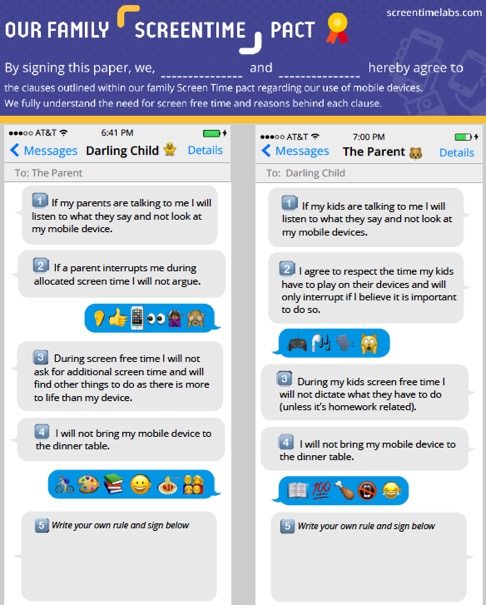
We’ve installed the Screen Time‘s App on our children’s devices and I am really pleased. I am using the Premium Account and I get a daily report in my inbox of what apps my children are accessing and for how long. I’m excited to see how this can help my family get a handle on our screentime. Note: we did try a screen time monitoring app before and while it was okay, I feel that Screen Time is different and more comprehensive. Plus, it was super easy to set up and the reports in my email inbox make it much easier for me to check what’s going on as I’m on the go.
Check out the features of Screen Time below.
Screen Time Features:
Free 14-day trial for Premium service
Basic Account is free and you get:
- Remote device monitoring
- Web and search history
- One device per child

- Premium Account is $3.99/month and you get:
- Daily web and app use reports
- App download approval
- App blocking
- Time limits
- Bedtime and school time restrictions
- Pause & Play to pause a device or reward with bonus time
- Homework and task lists with parent notifications for completion
- One account with unlimited devices
- Remote management
- Multiple administrators
- Uninstall prevention
Now, we haven’t started using the bedtime or school restrictions yet or rewarding with bonus time, but I expect we’ll start to very soon. I love that I can award time for chores and good behavior — which is a proven incentive in my house.
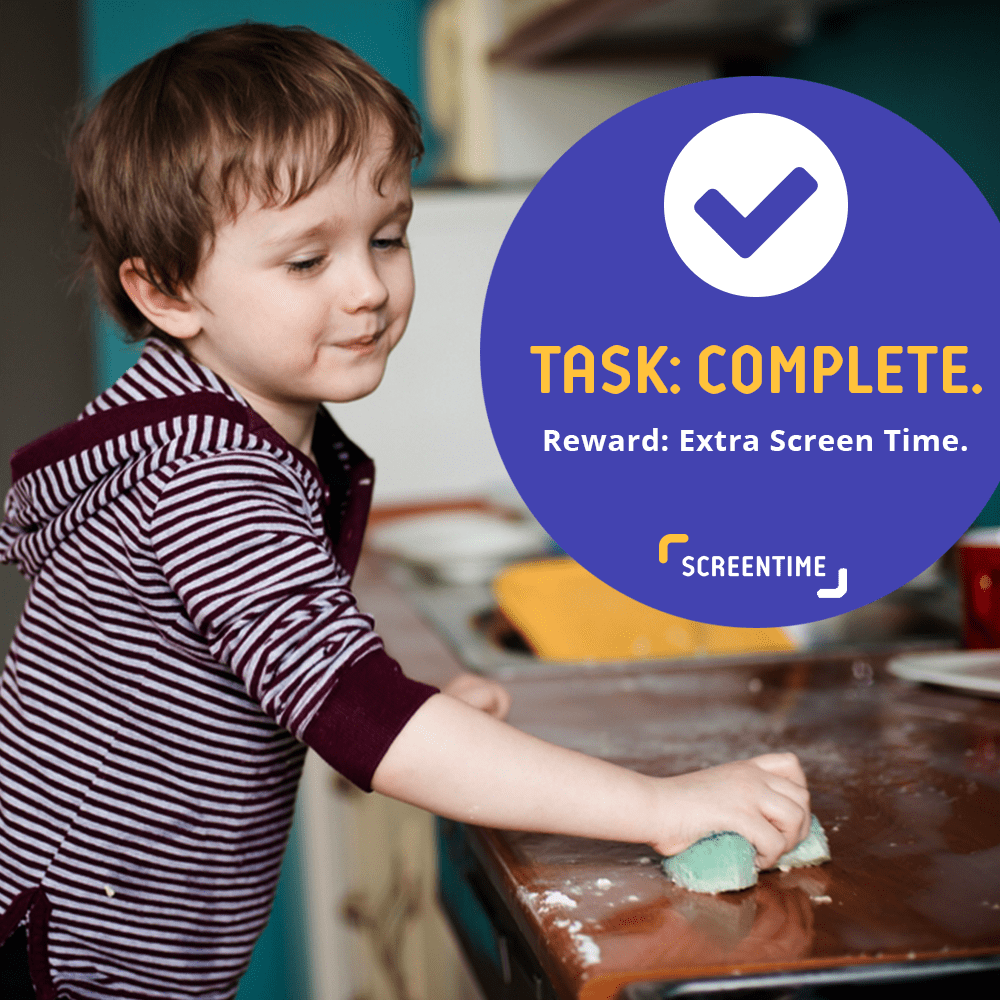
For more information on Screen Time:
Website: https://screentimelabs.com/
FAQs: https://screentimelabs.com/help-center/faq-home/
Screen Time Facebook: https://www.facebook.com/ScreenTimeLabs/
Screen Time Twitter: https://twitter.com/screentimelabs
Screen Time isn’t all bad, but I feel there are benefits and drawbacks — parents should be informed.
Benefits of Screen Time:
- Screen time can help develop some physical and cognitive skills (Psychology Today)1
- Playing with tablets and iPhones can help develop coordination, hone quick reactions, and sharpen language skills1
- Electronics can be used as supplements for learning enhancement (Phys.org)2
- “The benefits of technology depends on the way children, parents and teachers choose to use it to enhance learning. When used well for educational purposes, the latest technology can help create opportunities for more active and meaningful learning experiences.” – Professor Mark Brown, director of Massey University’s (NZ) National Centre for Teaching and Learning2.
- Moderate use of electronics facilitates digital literacy, a valuable 21st century skill2.
-
- Those who spend more time on social networking sites and who instant message more often are better at dispensing “virtual empathy” and social support3.
- Practicing virtual empathy leads to increased ability to express real-world empathy3.Use of social networking and messaging sites can provide outlets for developing social skills and relationships (Rosen, 2012)3
Downsides of Excessive Screen Time:
- A large amount of screen time can impede the development of cognitive and physical abilities (Psychology Today)1
- Between birth and age three, the brain is building the permanent foundation for later brain function.1
- A child needs specific stimuli from the outside environment in order for their brain’s neural networks to develop properly. These stimuli are not found on electronic screens.
- “The ability to focus, to concentrate, to lend attention, to sense other people’s attitudes and communicate with them, to build a large vocabulary – all those abilities are harmed [by excessive screen time].” – Dr. Aric Sigman1
- Between birth and age three, the brain is building the permanent foundation for later brain function.1
- Less time for play
- Studies have demonstrated a negative correlation between amount of screen time and amount of physical activity (Anderson et al., 2008)10.
- Loss of social skills
- Screen time can inhibit children’s ability to gauge the emotions of others (TIME)9.
- Researchers at UCLA found that children who were deprived of screens for five days got significantly better at reading people’s emotions than children who continued using screens9.
- Screen time can inhibit children’s ability to gauge the emotions of others (TIME)9.
- Behavioral problems
- Excessive screen time can lead to irritability and mood dysregulation in children (Psychology Today)8.
- Screen time can induce hyperarousal and a demand for constant stimulation8.
- Obesity
- A 2013 longitudinal study by Mitchell et al. found positive associations between screen time and body mass index for adolescents (International Journal of Obesity)6
- Lowering screen time could contribute to reducing the prevalence of adolescent obesity6.
- Irregular sleep schedules and shorter duration of sleep
- As screen time increases, sleep time decreases at the current time as well as longitudinally (Barlett et al., 2011)7
- Sleep also functions as a mediator between screen time and negative health outcomes.7 Excessive or poor-quality screen time can lead to the following negative health/behavioral outcomes (Mayo Clinic)5:
Benefits of Non-Electronic Play
- Unstructured playtime is more valuable for a young child’s developing brain than electronic media (Mayo Clinic)5.
- Children younger than age 2 are more likely to learn and remember information from a live presentation than they are from a video5.
- Play allows children to use their creativity while developing imagination, dexterity, and physical, cognitive and emotional strength (Shonkoff et al., 2000)11
- Imaginative play is vital in the development of capacity for a child’s cognitive flexibility and creativity (Psychology Today)12
- Make-believe games are precursors for the capacity to self-regulate, including decreased aggression, civility, and empathy12.
- Taking on different roles in imaginative play allow children to learn social skills such as communication and problem solving12.
- Outdoor play for children provides a wide variety of benefits, such as (Early Childhood Learning & Knowledge Center, a subsidiary of the US Dept. of Health & Human Services)13:
- Becoming fitter and leaner
- Developing stronger immune systems
- Lowering stress levels
- Encouraging active imaginations and creativity
- Developing respect for themselves and others.
Citations:
- https://www.psychologytoday.com/blog/behind-online-behavior/201604/is-what-screen-time-really-does-kids-brains
- http://phys.org/news/2013-01-technology-essential-children-success-professor.html
- Rosen, Larry D. iDisorder: Understanding our obsession with technology and overcoming its hold on us. New York: Palgrave Macmillan, 2012.
- https://www.aap.org/en-us/advocacy-and-policy/aap-health-initiatives/pages/media-and-children.aspx
- http://www.mayoclinic.org/healthy-lifestyle/childrens-health/in-depth/screen-time/art-20047952
- http://www.nature.com/ijo/journal/v37/n1/full/ijo201241a.html
- Natalie D. Barlett, Douglas A. Gentile, Christopher P. Barlett, Joey C. Eisenmann & David A. Walsh (2011): Sleep as a Mediator of Screen Time Effects on US Children’s Health Outcomes, Journal of Children and Media.
- https://www.psychologytoday.com/blog/mental-wealth/201508/screentime-is-making-kids-moody-crazy-and-lazy
- http://time.com/3153910/why-access-to-screens-is-lowering-kids-social-skills/
- http://bmcpublichealth.biomedcentral.com/articles/10.1186/1471-2458-8-366
- Shonkoff JP, Phillips DA, eds. From Neurons to Neighborhoods: The Science of Early Childhood Development. Washington, DC: National Academy Press; 2000.
- https://www.psychologytoday.com/blog/beautiful-minds/201203/the-need-pretend-play-in-child-development
- https://eclkc.ohs.acf.hhs.gov/hslc/tta-system/teaching/eecd/nature-based-learning/Benefits%20of%20Nature%20and%20Outdoor%20Play/outdoor-play-benefits.pdf




Control is absolutely essential I’d say and that’s to protect our children. Our family tested Kidslox and I can tell that we are satisfied with this app. My son was addicted to playing games all day long and we had so much fighting. So we found the way out. I installed this app and not he has just two hours per day to use his mobile. Also, he has schedules et on his phone for Homework, Bedtime. No fightings anymore. Kidslox saved our family.
This looks like an interesting way to solve the new age parenting problem of screentime
We definitely need this in our life, our youngest who just turned 6 unfortunately far exceeds the 1 hour of recommended screen time. I try to eliminate tablets and gaming during the week. Thanks for sharing!
This sounds like a great app! My grandsons get so upset with me sometimes when I tell them that they’ve been on their iPads long enough.
I love the idea of this app! Makes total sense. Thank you so much for sharing about it!
I am going to get the screentime app! My son and I could really benefit from it I think.
Oh this is something that would come in handy in my life – Branden spends way too much time on the tablet and always fights me when its time to get off. Checking this out asap!
Screen Time sounds great! It can be so tricky limiting a child’s time on electronics!